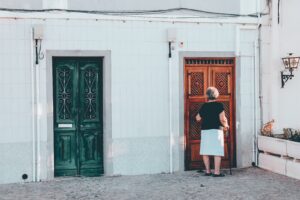It’s well documented that having friends enriches our lives and our health, by doing things like preventing loneliness, celebrating the good times, and increasing our sense of belonging. Friends also support us during bad times. And, quite literally sometimes, may actually save us. If you’ve ever had to do a wellness check on a friend, or had a friend check in on you, you know what that’s like.
Official wellness checks are when you are concerned about the safety or health of someone you cannot get in touch with, typically someone who lives alone or is traveling on their own, though that’s not the case. Sometimes, people choose to call law enforcement to conduct a welfare check, especially when you live far away or don’t know any of your friend’s neighbors. In some jurisdictions if you live in the area, you can accompany the police when they go to check in. We know there are stories of official wellness checks from police officers that have turned out tragically; and understand that some of our friends and neighbors don’t feel safe with that kind of check-in.
Unofficial wellness checks are something we do with our friends, too. We encourage this! It can be as simple as asking a friend to text you that they are home and safe, or share with you any trip info when they’re traveling on a plane, in a taxi or with a car-sharing service.
And, you could knock on a friend (and a neighbor’s door) when you haven’t seen them when you usually would have. Because things happen—people trip and fall, get sick and aren’t able to get themselves help. All sorts of things can go wrong.
We’ve done wellness checks of all kinds. In one case a friend was in danger from someone she knew and we sent the property manager to go to her home when she didn’t appear at a planned event. In another case, a friend missed a meeting and didn’t answer her phone. We were planning to go to her house to check after a certain number of hours if we hadn’t heard back. In a different case a friend didn’t answer her door and no one had a key. After calling law enforcement to help us get in, we discovered she was very sick and she was then transported to the hospital.
In the first two instances, our friends were fine. Asleep in one case, exhausted from a demanding work schedule, with her phone in silent mode. In the other case, she was on an airplane, having forgotten to update us of changed plans. In the third case, we were relieved to get her help.
Official or unofficial, there are some key steps to take with your friends now, to ensure you can help each other if needed.
- If you live in the same area, share keys with friends or neighbors you trust. And let other friends know about it.
- However near or far you live, share contact information for people who have keys or are likely to know what you’re up to, like family members, neighbors, or close friends.
- Alert friends if there is something to be concerned about—if you are sick and fear it may get worse, or if there is a direct threat, like having a restraining order out against someone.
- Plan regular check-ins. Pick a way to stay in touch that works for you both and for the situation, such as phone calls or texts when someone gets home, with an agreed on action if you don’t hear from them. Such as: “If you don’t text when you get home, within 30 minutes of leaving here, I’ll call twice within the next hour. If you don’t answer the phone and tell me you are ok with a predetermined phrase, I’ll call the police and send them to your house.” (A real plan we’ve made for a friend in trouble.)
We very much appreciate our friends who check in on us and make sure we’re ok. Taking care of each other, even from afar, is one of the special parts about being friends. Thank you in advance for taking care of each other!
Photo by Dorien Monnens on Unsplash

